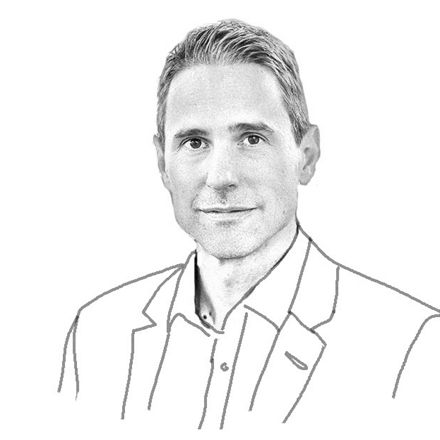Professor Kleijn, last year you described in one of your papers how a suddenly erupting war can lead to severe supply disruptions for materials that are critical in the energy transition. That’s exactly what has happened one year later in Ukraine. Do you have a prophetic gift?
René Kleijn: Of course I would rather have been wrong than be in the situation we are in right now. The global transition in terms of renewable energy has accelerated in the last few years. That’s good because we have to comply to the global climate goals. But if we are really going to make this transition, it will require a huge amount of material—and nobody really knows where those materials will come from. I’ve been working on this topic for quite a while so I’m happy to be one of the individuals who has predicted the problems that might occur a bit beforehand.
In many industrial countries the energy transition started 20 years ago. Why didn’t we prepare for situations like these?
There’s been a lot of confidence that markets would solve these types of issues of supply and demand. Many politicians follow the idea that if demand is there, supply will somehow materialize. This obviously is not true in every case. Since the beginning of the COVID-19 pandemic we’ve been confronted with the fact that we are very reliant on global supply chains—take face masks or components for ventilators. When the supply from China was disrupted because of lockdowns and harbors not operating, the whole global distribution basically broke down.
The logistical effects of the pandemic have decreased. Why are we still suffering from shortages of critical raw materials?
We are in a situation where mining companies have to make investments far in advance in order to get mines up and running. It’s a long process that can take 10 to 20 years, from finding a resource somewhere, obtaining the permits, doing the exploration and getting the funding in place to open a new mine. Take, as an example, copper that is needed in generators for wind turbines, in solar cells and in the electricity grid. Mining experts told me that to meet the upcoming demand in the next 30 years they would have to invest into two large mines every year starting today! This gives you an impression of the type of effort that is needed to produce the materials needed for the energy transition. In this context, we cannot simply rely on markets
»In this context, we cannot simply rely on markets«
René Kleijn
And that’s not even taking into account political problems like Russia—a country we have recently tried to avoid global trade with.
Exactly. In some cases we rely on imports from authoritarian states and, as we see with Russian gas, it’s quite difficult to enforce sanctions if you depend on these imports. And there’s no way that we could ever introduce the same type of measures for China.
Does this mean we have to turn back globalization in favor of a more regional approach?
Not necessarily. But we do have to look at the resilience of supply chains in order to absorb shocks in the system. The more resilient you are, the more shocks you can absorb, whether they are demand shocks like the quick uptake of electric vehicles, for example, or supply shocks where you suddenly don’t have materials from Russia and Ukraine available anymore because of a conflict.
How can we create resilience?
One thing is to diversify our supply. A lot of regions like the US or Europe are looking at safe and reliable partners like Canada or Australia from which we can get lot of our raw materials in a way that we find acceptable. But we also have to consider more mining within Europe…

…which is not an easy task
Indeed, we’re not used to large scale mining in our backyards anymore. However, we need to use way less mining for renewables than we have used and still are using for coal mining.
This argument won’t convince the people who are directly affected in their communities.
That’s true. We should be aware of that and understand it. However, we have this problem with many aspects of the energy transition, whether it’s mines or wind turbines or power lines. We also have good ways to deal with these concerns in terms of public involvement during these processes. That’s why Europe sometimes cannot act quickly.
You are suggesting financial compensation?
There has been a huge resistance against compensating people for impacts that they have encountered. Let me give an example from my country: We have closed a huge gas field in the North of the Netherlands because the extraction of the gas caused small earthquakes—without catastrophic consequences. The operator and the government made a huge sum of money from extracting the gas. If you had one percent of that revenue flow into the local communities, it might have solved all the issues. The gas field could probably still be open and play an interesting role in the current energy situation.

What’s in it for people in other parts of the world where we source many critical raw materials like cobalt?
There are a lot of places in Africa where local communities are very disappointed with the way the Chinese operate in their countries—paying to the elite, extracting the resources, and maybe building a railway or a road here and there. I think we can act differently. We can bring long term commitment. We can bring a social and responsible type of mining there. We can help the people to earn some money from extracting resources, and at the same time also develop local communities. I know this sounds a bit idealistic and would be difficult to make happen in countries where a lot of corruption exists. But I do think this could be a unique selling point for European sourcing activities.
Will this strategy lead to higher prices for strategically important materials in the future?
Kleijn Yes, I think we have to pay for more security of supply. Furthermore, the European Commission is aiming for responsibly sourced materials. And that means that there is also a price premium for materials being responsibly produced and mined, in Europe where we have environmental legislation and take care of local inhabitants, whilst materials from mined in an irresponsible manner and refined in China might not have that label.
If we’re struggling so much to secure the supply of raw materials—shouldn’t we ask ourselves if we really need all these materials?
Indeed, you could really question whether everybody should have a 60 kWh or even 100 kWh battery in his or her electric vehicle. That leads to a huge amount of material wasted because the car is just standing there for most of the time not being used. Do we really need that? Once you start integrating cars into the electricity network, it’s maybe going to be a different story. But a reduction of energy use and material consumption is always the best and cheapest and most sustainable option. Sometimes, we tend to forget about that.
Many companies, like Evonik, are working on new generations of batteries that don’t contain rare and expensive ingredients like lithium at all. Will scarcity of resources induce faster technological progress that helps us overcome some of the current problems?
I’m very optimistic about what technology can do. We already have lithium ion phosphate batteries that don’t use any cobalt. They have a little bit less capacity than other batteries but at the same time they are also safer in terms of fire hazards. However, in the end, it’s not only engineering, it’s also economics, it’s business models: The product that sells best and makes the most money is not necessarily the one that is engineered best. Therefore, it’s important for governments to set out biases. If we really want to steer our engineering capabilities, our ingenuity, our creativity in the right direction we should have something like a carbon price, for example.

We’ve already introduced carbon pricing in recent years…
…which is a good start. Including the costs of environmental degradation into the cost of materials increases the price of materials and makes the circular economy a lot more attractive. People take care of materials much better than before.
However, some business models won’t work anymore if prices for raw materials are increased very strongly by political regulation. Do we simply have to accept that?
Yes, raw materials will become more expensive. But I don’t see how you could do it in any other way. The extraction of raw materials leads to a lot of environmental degradation that’s in many cases not being paid for at the moment. There is no way we are going to meet our climate goals if we don’t have carbon pricing.
Is it just the relatively low price of freshly mined material that makes recycling so difficult?
We live in a throwaway society where materials are just too cheap to actually matter. Within the EU Horizon 2020 funded SUSMAPRO project we work together with the university in the German city of Pforzheim and investigate the recycling of rare earth metals, which are crucial ingredients for the energy transition. They are in the magnets of wind turbines and the motors of electric vehicles. There will be a huge need for magnets. The technology to recycle them is currently being optimized within the project—that will not be the issue. Another part of the problem is: How do you get these magnets from the electric vehicles to the recycling plants? Have you ever seen the motor of an electric car with its rotor? It consists of steel blades with holes. The magnets are often glued into the holes. So if you want to recycle these magnets, you have to dismantle all of the housing in order to get to the motor. Then you have to take out the motor, dismantle it to reach the rotor and somehow get these magnets out of the rotor that they are glued in. After that, you have a hundred euro or so of material. This is not going to fly economically.

You are asking for stricter regulation?
Yes. Either you have to enforce recycling of this stuff or you need a huge price premium on recycled materials. That’s the only way this will work out. Today, the price of the material alone is not enough to steer the system in the right direction. Materials are extremely cheap, and labor is extremely expensive in countries like the Netherlands or Germany. That’s in part because environmental and social costs are not included in the price of materials. They’re often mined in places where there is not enough environmental legislation and awareness of social issues. Calculations show that if you sourced materials responsibly, something like an iPad might actually cost around 10.000 Euros.
»I’m very optimistic about what technology can do«
René Kleijn
For some materials like cobalt or nickel, recycling already seems to work very well. In the EU these materials are recycled at an estimated rate of 95 percent, with copper up to 80 percent. On the other hand, lithium is virtually not recycled at all. Can you explain this?
Again, it’s about the prices of the materials. Nickel and cobalt are more valuable than lithium. However, the price for lithium has increased dramatically over the last couple of months. So maybe recycling is getting economically more attractive. Technically, recycling the main ingredients of batteries is not very difficult: You can basically discharge the battery, throw it into a shredder and then separate the materials from each other. That’s a cheap process that you can do at a large scale. And that’s the point: There’s only a business case for recycling if you can do it at a large scale.

The trend towards electric mobility has started just some years ago—with only a few million cars and batteries being already on the road. It’s still 15 or 20 years from now that these batteries will be ready for recycling. Are we too impatient with regard to circularity in this field?
It’s not going to be for the next 10 to 20 years that we can rely on the circular economy to provide a significant part of the inputs. So for the moment, we need to have a lot of input from primary sources—we are building up our stock of materials. But today we have to make sure that products are designed in such a way that one day we can actually get those materials back and recycle them.
If your scenario is a circular economy for critical raw materials—why would a mining company invest billions in setting up operations that are superfluous in 30 years? That’s a dilemma
That’s a dilemma, indeed. Miners are generally hesitant, because 20 years ago they were promised a large market for materials that are needed for all these green technologies. They invested in mines, but as it turned out the market took up much slower than they anticipated. There was overproduction and the prices went down. So why should they invest now?
One idea could be to invest public money.
This could be a valid strategy. Take as an example rare earth materials, which actually aren’t rare at all: Their price is extremely low if you compare it to the price of the final products in which they are being used. So the added value you can create with just investing in a few hundreds kilotons of material is huge. It’s strange that the US or the EU—huge economic powers—have just not acted upon that. Unlike Japan that has invested in specific mines and refineries like the Australian Lynas.
Could this example serve as a role model for the EU?
In Japan, the industry is very much linked to the government and therefore the government really acts upon what the industry wants. In China, a lot of these companies are basically state owned. In the US, we can see huge government involvement to secure the supply of raw materials for batteries by using legislative measures like the Defense Production Act. Here in Europe we don’t have that tradition of interfering in these industries, except for maybe France. In Germany it’s already a lot softer. If the large car manufacturers complain that they don’t have enough raw materials, the German government will act with bilateral agreements with other countries. Countries like the Netherlands or Denmark are not into that at all.
Since 2020, we have the European Raw Materials Alliance, an organization to ensure reliable, secure and sustainable access to raw materials. Wouldn’t this be an institution to bring forward more investment in this field?
The ERMA is an organization that is at least thinking about these issues. And there’s a lot of funding going into research projects. But I don’t see that power politics in Europe that you have in Japan, in the US or in China. Although that might change in the near future since a Raw Materials Act is coming up in the EU. I’m not sure what that will entail, but it’s one step in that direction.
In wake of the war in Ukraine, we have experienced a rebound of fossil fuels like coal for example. Are you afraid that the trend towards renewables is losing pace?
Indeed, circumstances are changing. In many regions solar power is the cheapest energy that you can have—even without intervention from governments. So it should prevail in a free market. But now, again, prices are rising because of raw material prices going up. I think we can solve a lot of issues. But governments have to set the right boundaries within the market economy so engineers can go in the right direction. Engineering and economics will not do that by themselves.



